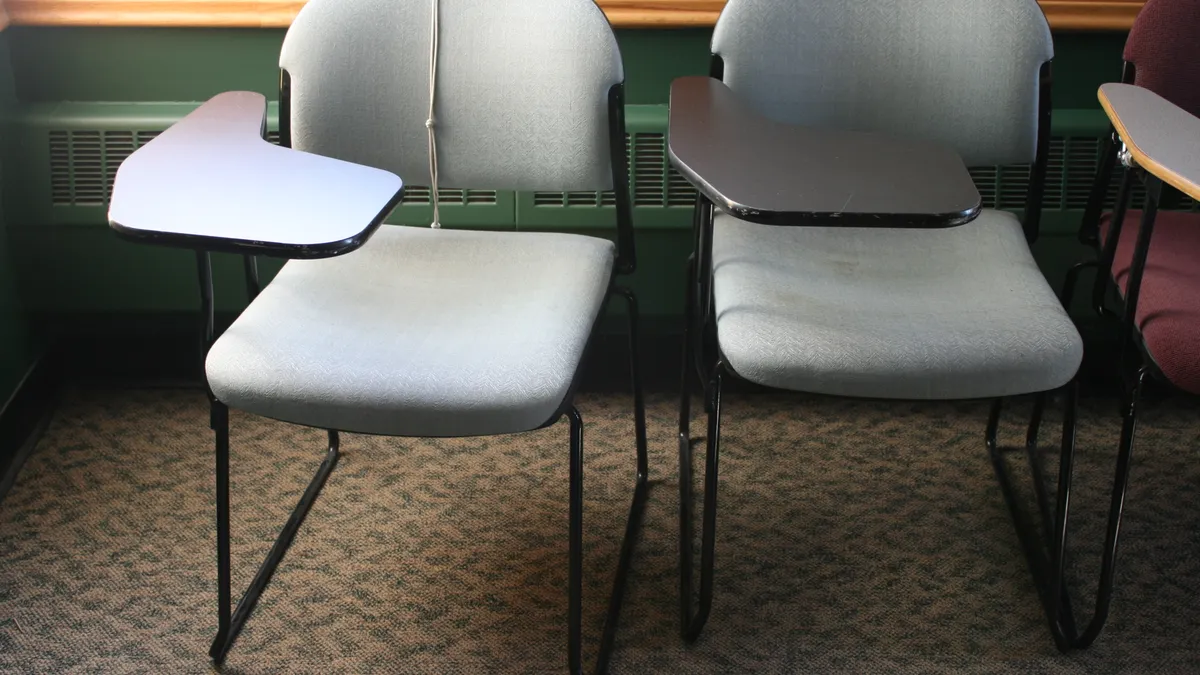Dive Brief:
- Around 17% of 1,171 high school seniors who planned to attend a four-year college full time before the coronavirus pandemic no longer plan to do so, according to a recent survey from Art & Science Group, a higher education consulting firm.
- Of that group, 40% had already made a deposit to a college. Two-thirds of surveyed students also said they were worried about being able to attend their top school.
- As colleges stress about their fall yields, the findings indicate deposits will be a less-reliable indicator of students' commitments than they have been historically.
Dive Insight:
College administrators are concerned they won't be able to fill their classes this fall because of the pandemic's economic impact. The coronavirus has largely spoiled the recruiting season by forcing officials to cancel campus tours and other events, though some colleges have held them virtually.
Uncertainty also abounds over how the fall term will be conducted. Although a handful of colleges have told students they will start the 2020-21 academic year online, others haven't announced their plans or are preparing for several scenarios.
"Students want a four-year residential college experience," said Richard Hesel, principal at Art & Science, in an interview with Education Dive. "If they can't have it, they'll delay going, they'll switch places." Even if they made a deposit, he added, "they may not go anywhere."
Some observers say students may respond by turning to community colleges as a way to spend less on tuition or skip the fall term entirely by taking a gap year. Subsequent enrollment declines could hurt four-year colleges, many of which have had to issue room and board refunds and make major investments in their digital infrastructure in short order.
Although the U.S. Department of Education is distributing about $14 billion to colleges from the CARES Act, higher ed groups say the amount is not enough to cushion the financial blow from the pandemic.
Christina Paxson, president of Brown University, argued in a recent op-ed for The New York Times that keeping campuses closed will likely be the last straw for some cash-strapped colleges. "It's not a question of whether institutions will be forced to permanently close, it's how many," she wrote.
Around 400 colleges have extended their decision deadlines, which typically fall on May 1, by a month, according to the survey. But as of April 24, 40% of respondents who still plan on attending a four-year college haven't made a deposit.
"Even considering the shifting admissions deadlines, this seems to us a fairly striking gauge of students' uncertainty about the fall," the authors wrote. Additionally, more than four-fifths of students who haven't made a deposit have expressed uncertainty about their ability to attend their first-choice institution.
Other recent surveys of students and parents have yielded mixed results about their plans for the fall term.
Of more than 400 parents of college students polled by investment bank and consulting firm Tyton Partners, just 10% said they are comfortable with their children returning to campus in the fall based on how institutions are currently operating. If colleges don't meaningfully reduce their prices or improve remote learning, as many as 40% of students could choose not to attend college this fall, the results indicate.
But there's hope a majority of students will reenroll. Just one in ten college students aren't certain they'll return this fall or have already decided not to do so as a result of the coronavirus, according to a survey from the American Council on Education and the American Association of Collegiate Registrars and Admissions Officers.










